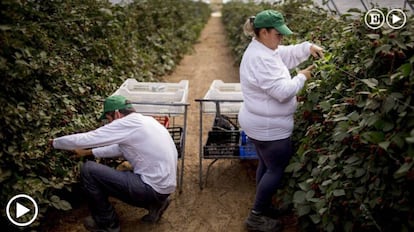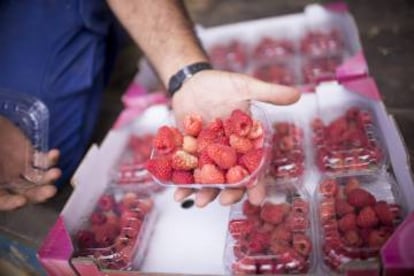Spain discovers the benefits of berries... to the economy
The strawberry fields of Huelva are increasingly being turned over to growing the new super food

Widely considered as one of the most potent super foods, the berry may not yet have taken off on the Iberian Peninsula but demand abroad continues to rise: four out of every 10 berries in British kitchens now come from Spain, or more specifically Huelva, where where 95% of the country’s berries are grown.
“Demand for this kind of fruit has soared, while strawberry exports have dropped thanks to strong competition from other countries,” says Rafael Domínguez, director of Freshuelva, a representative association for companies in the sector. And although the strawberry is still tops, it is gradually ceding to its rivals.
Of all the berries, the cranberry has seen the steepest escalation in demand over the past four years, with exports rising by 138% in that time. Hard on its heels is the raspberry with a 129% increase, while blackberries have been subject to a more modest rise of 35%, according to the Spanish Federation of Associations of Producers and Exporters of Fruits, Vegetables, Flowers and Live Plants (FEPEX).
Land allocated to growing blackberries has expanded by 160% over the past four years, yet when it comes to eating them, Spaniards lag behind the rest of Europe and the United States
Naturally, there are now more berries than ever being grown in Spain. Land allocated to the blackberry has expanded by 160% over the past four years, to the cranberry by 151% and to the raspberry by 51%, while strawberry fields have shrunk by 8.43% in the same period. Yet when it comes to eating them, Spaniards lag behind the rest of Europe and the United States.
“Spain does not have a berry culture,” says Domínguez. “So we’ve decided to change this with comics for children and conferences for adults.”
The sector is convinced that Spain simply needs to be more informed on the health properties of berries, which can help in the prevention of cancer, heart disease and diabetes, among other things.
“It would have been easier to focus on the strawberry because there seems to be more information on its health benefits,” says Daniel Velo, the owner of El Bosque which has been concentrating on blackberry production since 1995. “But the blackberry was largely unknown and a good market to get into. It’s been a slow process but we’re growing more all the time and creating more jobs.”
In the first five months of this year, at least 112,000 workers have been hired to pick berries in Huelva, according to the deputy of the provincial government, Enrique Pérez Viguera. Most of them are locals employed on a temporary basis, but some enjoy more stability.

“I lost my job in a restaurant and came to the country,” says Mario Sánchez, 57, during a rest from picking blackberries in Rociana del Condado. “My wife and daughters work here. It’s hard work but you can make a living. At the start, the working day was shorter, but it’s gotten longer and longer, but I like working in the fields.”
“There are hardly any immigrants now,” he adds. “Those that are here are residents in Spain, like the Romanians. I was lucky to start a long time ago and I work all year round. I will stay here as long as I can, Monday to Saturday, whatever the season.”
Brexit fears
In 2015, 10% of Spain’s strawberry exports – amounting to 33,500 tons – went to Britain, along with 40% of its other berry exports, or 16,000 tons, making Britain one of the main importers of Spain’s berry produce.
Consequently, Brexit has taken its toll, with the price of fruit plummeting by almost 10% due to the 7.48% fall in the pound caused by the surprise referendum result. Growers producing the last berries of the season – blackberries and raspberries – are being hit with big losses. The average price of a 125g tub hasn't changed since the referendum, remaining at around €1.16, and if the price remains the same but the pound weakens, profits fall.
Sign up for our newsletter
EL PAÍS English Edition has launched a weekly newsletter. Sign up today to receive a selection of our best stories in your inbox every Saturday morning. For full details about how to subscribe, click here.
The big question is what kind of trade agreement the UK is going to have with the EU. As far as Domínguez is concerned, export policies are already quite rigorous. “They could increase the number of inspections which would make it more difficult to get the produce in,” he says. “We understand that the UK could start campaigns and pass laws favoring trade for their own produce which would put countries such as ours at a disadvantage.”
While the consequences of Brexit unravel, the sector is studying possible strategies. “If they don’t work, we’ll have to seek out new horizons. Nobody was expecting this,” says Domínguez.
English version by Heather Galloway.
Tu suscripción se está usando en otro dispositivo
¿Quieres añadir otro usuario a tu suscripción?
Si continúas leyendo en este dispositivo, no se podrá leer en el otro.
FlechaTu suscripción se está usando en otro dispositivo y solo puedes acceder a EL PAÍS desde un dispositivo a la vez.
Si quieres compartir tu cuenta, cambia tu suscripción a la modalidad Premium, así podrás añadir otro usuario. Cada uno accederá con su propia cuenta de email, lo que os permitirá personalizar vuestra experiencia en EL PAÍS.
¿Tienes una suscripción de empresa? Accede aquí para contratar más cuentas.
En el caso de no saber quién está usando tu cuenta, te recomendamos cambiar tu contraseña aquí.
Si decides continuar compartiendo tu cuenta, este mensaje se mostrará en tu dispositivo y en el de la otra persona que está usando tu cuenta de forma indefinida, afectando a tu experiencia de lectura. Puedes consultar aquí los términos y condiciones de la suscripción digital.









































